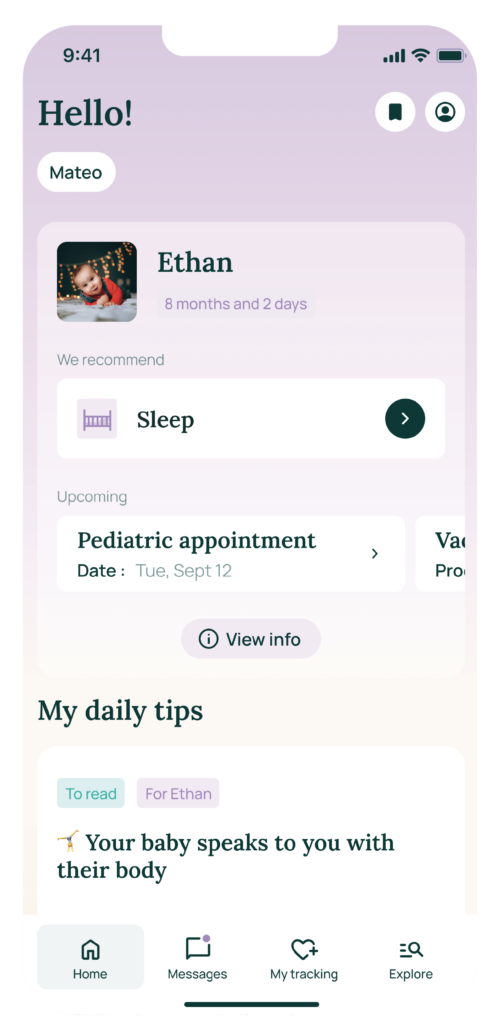
Our most viewed articles
All articles


First trimester pregnancy recipes : ideas and advice

Coloring your hair while pregnant: what precautions should you take?

What diet during the holidays while pregnant?
Access more articles, tips, and Mya by downloading the May app
Try the app for free for 14 days.


Tips for managing a cold during pregnancy

Bitter taste in the mouth during pregnancy: causes and solutions

Hit to the belly during pregnancy : when should you be concerned?

Mucus plug: what you need to know in case of loss

Homemade pregnancy tests from our grandmothers

Pregnancy: Recognizing the First 12 Signs

Girl-and-boy twins: everything you need to know about mixed twins

Alcohol and pregnancy: what are the risks?

Pregnancy and Sexuality: What Changes?

Insomnia during pregnancy: how can you sleep better?

Cured meats during pregnancy: what are the risks?
Pregnancy: the first steps toward motherhood
Pregnancy, the result of the fertilization of an egg by a sperm — is a major turning point in a woman’s life. It lasts for nine months, or 39 weeks, and is divided into three trimesters. During this unique time, you’ll go through many physical changes and prepare to become a mother.
As an expectant mother, it’s important to be supported by healthcare professionals such as your general practitioner, a gynecologist, or a midwife.
What a transformation! How can you be sure you’re pregnant, and what steps should you take? May is here to answer all your questions!
Early signs of pregnancy
The absence of menstruation (also known as amenorrhea) is often one of the first signs of pregnancy. However, it’s not always a reliable indicator.
Pay attention to your body! If your missed period comes with regular nausea, bloating, breast tenderness (due to hormones), and a higher body temperature (around 37.8°C), pregnancy is a possibility.
The pregnancy test! If it’s positive, make an appointment with your GP, midwife, or gynecologist to confirm the pregnancy and file the official declaration. They’ll then schedule your first ultrasound and any necessary blood tests.
The first trimester is crucial. While the risk is low, miscarriage can occur. These are three months during which the embryo becomes a fetus. It’s also a time of intense hormonal change: your body is undergoing major transformations. Don’t worry—regular prenatal check-ups (monthly appointments and one ultrasound per trimester) ensure that both you and your baby stay healthy throughout this journey.
Should you pay attention to your diet during pregnancy?
As you might expect, a balanced diet is essential!
Focus on nutrient-rich foods that contain iron and magnesium. You can eat meat and fish, as long as they’re well-cooked. Eating them raw carries a risk of listeria infection, which can be transmitted to the fetus via the placenta. Soft cheeses like camembert are also discouraged for the same reason. But don’t avoid all dairy! Eat plenty of fruits and vegetables—just make sure to wash them thoroughly.
Alcohol is strictly off-limits during pregnancy. Tobacco is harmful too, but if you’re a heavy smoker, try to cut down. As for tea and coffee, moderate consumption is okay, but avoid excessive amounts.
Besides your diet, physical activity is another key factor in promoting your baby’s development. As a pregnant woman, staying active is just as beneficial as eating well.
When is the baby due?
Childbirth usually occurs between the 37th and 42nd week of amenorrhea, with the official due date at 41 weeks. A birth is considered premature if it happens before 37 weeks.
Healthcare providers estimate your due date based on the first day of your last period. Keep in mind—it’s only an estimate! Your baby might come a little earlier or later.
Here are some signs that labor may be starting:
-
Contractions: When they become intense and occur every 3 to 5 minutes, labor is beginning.
-
Water breaking: The amniotic sac surrounding your baby ruptures. Time to go to the hospital—your baby is on the way!
Shortly after giving birth, many women face the question of breastfeeding. Remember—it’s a personal choice and every situation is unique. While breast milk has many benefits, bottle-fed babies can be just as healthy 😉
Every pregnancy is different. Physical changes, emotional ups and downs, questions and doubts… Rest assured, you’ll be supported every step of the way during these 9 months. And never hesitate to turn to health professionals for help.

